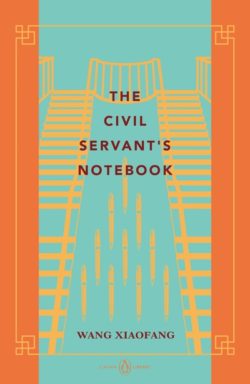The Civil Servant's Notebook by Wang Xiaofang
Viking 2015
Publisher's Blurb
Dongzhou City needs a new mayor. Devious plots, seduction, blackmail and bribery are all on the table in a no-holds-barred scramble for prestige and personal gain as the city's two vice-mayors compete for the top honour. At the centre of it all is a humble witness to events, a notebook whose pages contain information they should not …
Penned by a former insider, The Civil Servant's Notebook is a political page-turner that offers a glimpse into the complex psyches of those who roam the guarded halls of Chinese officialdom.
Reading Chinese Network Reviews
Reviewed by Andreea Chirita, 17/11/17
 “No kidding. Who doesn’t know that life is precious? But if you don’t have status, if you
“No kidding. Who doesn’t know that life is precious? But if you don’t have status, if you
don’t carry weight, if you have no position, then what’s the point?”
What other rhetorical outcry could be more quintessential in capturing China’s contemporary most divinized social credos than Ou Beibei’s? The bearer of such thoughts is also the unfortunate mistress of Peng Guoliang, vice-mayor of Chinese fictitious city Dongzhou, who gets in fierce competition for political power with mayor Liu Yihe in Wang Xiaofang’s most recent ‘officialdom novel’, The Civil Servant's Notebook, the first out of a series of twelve to be translated into English. Picked randomly, every single line of this courageous epic is suggestive of a harsh social critique exposé, filled with all the ingredients of an entertaining, dark Chinese political mafia story: corruption, consuming struggle for power, sex scandals, money embezzlement, psychedelic moral decay, lust, greed and anything else that would make Confucius turn in his grave.
Caught in the act of ousting his rival for the city mayor’s position, Peng himself falls prey to his own filthy political games by succumbing fast and surely to the luring power of money and corruption. He spends in Macao’s casinos millions of dollars belonging to the city council which triggers media investigations and eventually his subsequent fall and shocking condemnation to death. It is a typical Chinese story about corruption, strongly mirroring real cases that have been rocking China’s political scene, as well as the author’s real life experience as a civil servant back in the nineties, when his boss got caught up in a similar scandal.
Wang’s narrative intentions are nevertheless far more complex that autobiographical. Around thirty voices, all parts in the octopus-like organism that makes up the official apparatus of the city central power structure recount in the first person narrative their own vision of the filth they got caught up in. Their confessions elucidate gradually the sad saga of Peng’s rise and fall. Behind the details related to life at the top of Chinese officialdom, that they expose in investigative manner, lies a sense of victimhood, a sort of tacit and unspoken recognition of their own personal drama. A pervasive feeling of being trapped and unable to escape the web of dangerous liaisons, once entering the political stage, is what unites all of them in one single organic collective character. Its limbs and every single cell compose a tragic up-dated version of a Chinese “scroll painting of the soul”.
Wang’s investigation of the civil servants' allegedly poor psyche through unconventional
ways like the simple, almost naive language brings forth a performative outlook on characters’ dealing with their own sense of social entrapment. Every chapter has a different character up on stage, who tells his or her story in one breath and then leaves, to make room for another story, recounted by another story-teller, in a cumulative built-up of tension that frustratingly fails to explode. The staging of Peng’s fall by his rivals resounds with all other characters’ self-directing of their own respective lives, marred with grandiose dreams of careerism. The readers are not spared either, as they consequently turn into voyeuristic spectators of the games staged behind the curtains of Chinese politics, that an ex-insider like Wang himself can reveal. Even “the cars” driven
by or “the furniture” decorating the offices of the big guys making and breaking up the rules of politics recognize apathetically their condition of decorum on the symbolic stage of political power, as one office desk openly admits: “That means we office desks are like secret bases. Our masters’ questions of style, feeling and interest are all concentrated in us.”
The quantity of dark humor impregnating Wang’s writing is impressive and you may not
realize quite often what is the demarcation line between his sharp cynical ironies and sentimental confession. The author seems delighted in playing with and challenging the readers’ sense of humor as even the most sincere and emotional avowals are marked by self-awareness and splendid ironic distancing. The whimsical and darkly gay account of an otherwise disconcerting tough story on Chinese corruption at official level is what gives Wang’s style unique flavor. A sense of hope in regard to the human soul’s ability of redemption emerges throughout the novel and that’s the total merit of the characters’ unconscious “grey humor” and their ability to find lucidity amid despair. There is nothing more difficult than translating Chinese humor marked by myriad puns and culturally encoded ideologies, so exotic to the common reader. It is hard to tell how the English translator of The Civil Servant's Notebook, Eric Abrahamsen, managed to render so accurately that sense of pervasive detached, yet sympathetic irony, specific to Chinese common people. He did, however, an amazingly good job that may easily serve as manual for humor in translation. And consequently The Civil Servant's Notebook is vivid proof that Chinese sharp witticism is at its best when collaged on social critique of the darkest kind.
Reviewed by Andreea Chirita.
Reviewed by Paul Gardner, 8/11/17
 The Civil Servant's Notebook by Wang Xiaofang, translated by Eric Abrahamsen, is a tale of political intrigue, greed and temptation but, above all, of how corruption is endemic in Chinese politics.
The Civil Servant's Notebook by Wang Xiaofang, translated by Eric Abrahamsen, is a tale of political intrigue, greed and temptation but, above all, of how corruption is endemic in Chinese politics.
The eponymous civil servant’s notebook is at the heart of the plot. Peng Guoliang, the Vice-Mayor of a fictional Chinese city conspires to create a notebook suggesting his political rival, Liu Yihe, is guilty of corruption. However, the plan backfires and leads to Peng's investigation and arrest for corruption. He is detained in the Provincial Military HQ, which 'looked like a huge tombstone', before eventually being executed.
The story is also told in the form of a series of sections from notebooks, each written by key characters in the story. It is a device which gives us a real insight into the hearts and minds of each of the protagonists, but which at times is hard to follow given the number of characters, particularly for those less familiar with Chinese names.
Wang leaves us in no doubt about the scale of corruption that takes place at this level of
government in China. As the net closes in, Peng’s wife worries that although they have
transferred large amounts of cash overseas, 'Our ten golden Buddha statues alone are worth nearly a million’. She laments that ‘It's impossible to transfer several truckloads of stuff on a moment's notice.' Three years after the book was published in English, the Financial Times reported that as many as twelve trucks were needed to take away all the cash and precious gems stashed at the home of one of China’s top generals, Xu Caihou, after he was accused of corruption.
Peng is far from alone in making the most of the opportunities his office provides him with. The municipal office building is compared to ‘a golden imperial palace’, where most officials spend their days serving their own interests rather than those of the people. Peng’s wife observes that 'Corrupt officials are as common as sparrows'. A journalist, who himself is easily corrupted, writes ‘Who would want to become an official if it wasn't to profit by corruption?'
Wang pins part of the blame for the problem on Chinese culture. A corrupt former official,
turned corrupt monk, argues that ‘Chinese culture has little to say about good and evil. It's all about success and failure. If you succeed, that's good. If you fail, that's evil.' The implication being that as long as someone succeeds, it really does not matter how that success was achieved.
Another character criticises Chinese culture for emphasising loyalty but never truth. Wang even turns his pen on Confucius, who said 'The father conceals the wrongs of his son, and the son conceals the wrongs of his father, this is Righteousness.' One character also suggests the Confucian emphasis on being filial to your parents is ‘just a mask’. ‘Who are your real parents? Government officials of course.’ So when Peng comes under investigation, a number of those who work for him choose loyalty to him over the truth of his crimes and the interests of the public they are supposed to serve.
However, Wang places most of the blame for corruption at the door of a political system he sees as ‘rusted into immobility’. Indeed Wang’s portrayal of the corrupt officials themselves is quite sympathetic. He writes that ‘anyone who reached Peng Guoliang's status was liable to follow Peng Guoliang fate.' Peng himself suggests, 'Our expectations for our civil servants are far too high, far too grandiose. The pressure is far more than their flesh and blood bodies can withstand.' ‘They say absolute power corrupts absolutely’, the lead corruption investigator points out, observing that ‘the greatest flaw in the current system is the lack of effective checks or oversight against the depredations of ‘Number One’.’
Despite the fact that Peng is brought down in the book, Wang suggests that tackling corruption within the current political system will be a Sisyphean task, the boulder of corruption would grow larger and larger and however hard anyone tried to push it uphill, it was 'bound to roll back down every time'. He is also clearly cynical of the motivation behind anti-corruption efforts in China. One character in the book says ‘In politics, the best way of protecting yourself is to yell "stop thief!" whilst picking your neighbours pocket!’
China, Wang suggests, should be ‘establishing institutions and a system that inoculates civil servants against corruption from the beginning, changes he believes would not simply destroy the ‘corrupt parts’ but the ‘whole’ political system.
The Civil Servant's Notebook draws on Wang’s own experience as the secretary to the deputy mayor of a city in north-east China, who, like Peng, was brought down and executed for corruption. Once Peng has been executed, his fictional former secretary, decides to leave his job to write a novel based on his experience, as Wang himself did in 1999. ‘What had I done for society in my ten years in politics?’ Peng’s secretary asks himself. ‘ Not a thing. I could no longer be a parasite.’
In leaving government service to write his book, Wang, to some extent, follows in the footsteps of those scholar officials who served Chinese Emperors and dared to speak truth to power. Liu Yihe, one of the few uncorrupt officials in the novel, argues that ‘having the courage and strength to criticise yourself is the best measure of the true greatness and confidence of a nation’. As Liu drives away from the Provincial Party Committee at the end of the book he notices the words ‘Seek truth from facts’ over the gate. The phrase is a historical Chinese expression, later adopted by Mao Zedong. Wang seems to hope his readers will go away more inclined to seek truth in the facts, rather than simply accepting the version of the truth presented to them by their leaders.
Reviewed by Paul Gardner.
Reviewed by Dylan King, 17/10/17
 The Civil Servant’s Notebook follows the internal bureaucratic maneuvering ahead of the appointment of a new Mayor.
The Civil Servant’s Notebook follows the internal bureaucratic maneuvering ahead of the appointment of a new Mayor.
I’m curious how readers unfamiliar with Chinese politics and bureaucracy approach a novel like The Civil Servant’s Notebook. In my notebook, I hazarded a few observations about the type of novel that is translated into English. I will spare the reader all except one: I understand that Penguin is pitching to a different market than most publishers of Chinese fiction--my understanding is that part of the Penguin China scheme was marketing to customers elsewhere in Asia, and even a local Chinese audience for English-language books. That makes the choice of Xiaofang Wang’s The Civil Servant’s Notebook seem less out of leftfield, perhaps. It’s an interesting choice, still.
China’s literary landscape looks smoother through the lens of translation but it encompasses countless microgenres with no equivalency in English-language publishing. The officialdom novel is not recent. Wu Jingzi’s The Scholars from the mid-18th century should be cited as an example of a distant relative, and so should Li Boyuan's Officialdom Unmasked (there is fairly recent abridged translation by T.L. Yang available, published by Hong Kong University Press), which includes a chapter titled “How to be Corrupt and Stay Respectable” (and also "When Is a Gift Not a Bribe?" and "Doing Business in a Brothel") but the recent spate of novels set in the smoky offices of local governments seem to have more in common with another recent microgenre in Chinese popular fiction, the white-collar workplace novel (Chronicle of Du Lala’s Promotion remains untranslated but is the best-known iteration). Perhaps it’s misleading to say that these microgenres don’t exist in English-language literature because I’m thinking of a few examples right now and I’m sure you’ve got the same ones in mind.
But the officialdom novel under the reigns of Xi, Hu and Jiang is a somewhat grim prospect, even read from a distance and in English translation. Despite the narrative tricks (as every review has pointed out and as depicted on the cover, inanimate objects like pens and chairs take center stage, to condescend to the reader with their own didactic soliloquies), Wang Xiaofang’s novel is mostly bloodless white-collar office gossip. Although English-language reviewers have identified The Civil Servant’s Notebook as an exposé, it’s more of an assurance that what I believed to be true is true and can never be changed.
In contrast with its ancestors, The Civil Servant’s Notebook never really exposes anything that could lock someone up. It’s hopeless. The writers of Qing political novels also lived in a time of rampant corruption but were writing under a crumbling dynasty. There’s a sense of
hopefulness to a work like Officialdom Unmasked , written at the turn of the 20th century and give-or-take a decade away from the Xinhai Revolution that unseated the Qing rulers, which revels in the corruption of officials, who sell government posts and dash off last minute paperwork in brothels. The Qing political novel can be as didactic and dull as The Civil Servant’s Notebook but at least there are some spectacularly scummy characters, grimy details and a moral lesson.
Maybe I’m taking it out on the book because I resented Xiaofang Wang comparing himself to Mario Vargas Llosa, who won a Nobel Prize for his novels of official corruption, brutal hierarchies, and individual resistance. It was a Chinese writer that introduced me to Mario Vargas Llosa and his 1969 novel Conversation in the Cathedral , which is about corruption under another type of dictatorship. And let me also insert a plug for another officialdom novel set in a fictional northern Chinese city: Party Members by Arthur Meursault.
Perhaps a note about the translation. It’s very good. Eric Abrahamsen is a gifted translator, who has a good ear for the language of officialdom, and knows when to polish a turd of a phrase and when to let it fall into the trough with a thud.
Reviewed by Dylan King.
Reviewed by Katie Hunt, 15/10/17
 Overweight, impotent and forced by his boss to drink his own urine as a health tonic, Yang Hengda paints an unremittingly bleak picture of what it’s like to be a civil servant in China. An official in the fictional city of Dongzhou, he’s the first of multiple narrators introduced in Wang Xiaofang’s novel The Civil Servant’s Notebook. The novel sheds light on the dark underbelly of Chinese politics, detailing a world of scheming and corruption, where nobody seems to have any scruples in an all-consuming scramble for power. It’s an arena which the author is intimately familiar as a former private secretary to the deputy mayor of Shenyang. Wang switched to writing novels two years before his former boss was sentenced to death for gambling away US$3.6 million of public money at Macau’s casinos in 2001. Published in Chinese in 2009, the novel still feels timely as Xi Jinping’s anti-corruption drive fells flies and tigers and China’s leaders prepare for the closed-door maneuvering at the Communist Party Congress later this month.
Overweight, impotent and forced by his boss to drink his own urine as a health tonic, Yang Hengda paints an unremittingly bleak picture of what it’s like to be a civil servant in China. An official in the fictional city of Dongzhou, he’s the first of multiple narrators introduced in Wang Xiaofang’s novel The Civil Servant’s Notebook. The novel sheds light on the dark underbelly of Chinese politics, detailing a world of scheming and corruption, where nobody seems to have any scruples in an all-consuming scramble for power. It’s an arena which the author is intimately familiar as a former private secretary to the deputy mayor of Shenyang. Wang switched to writing novels two years before his former boss was sentenced to death for gambling away US$3.6 million of public money at Macau’s casinos in 2001. Published in Chinese in 2009, the novel still feels timely as Xi Jinping’s anti-corruption drive fells flies and tigers and China’s leaders prepare for the closed-door maneuvering at the Communist Party Congress later this month.
The action revolves around the rivalry to become Dongzhou’s next mayor, with the story being told from various members of competing factions. It’s a dog-eat-dog world: “In politics, the best way of protecting yourself is to yell ‘stop thief’ while picking your neighbor’s pocket,” one of the protagonists says early on in the novel. The characters’ lives are upended when a civil servant’s notebook full of shocking and salacious revelations is leaked to the provincial disciplinary committee, sparking a search for its author. The book is full of wry details about what it takes to get ahead; one aspiring section member, the son of wealthy businessman, could have driven a Benz to work but that would have upstaged the Audi-driving mayor and vice mayors, dooming his career.
But as intriguing as the book’s premise is and the real-life insight the author brings, the novel wasn’t a page turner, at least not for me. The rotating cast of narrators is confusing, as is keeping track of who’s aligned with who. What’s more, there’s not one character to really root for -- they’re all as venal and power-hungry as each other and the dogged pursuit of power at all costs, while no doubt intended as satire, ultimately feels demoralizing. Even after one official “Fatty Zhong” gets the shove and becomes a monk, it turns out he’s still on the make as the salaried CEO of a Buddhist temple. The action is broken up by the avant-garde and pseudo-philosophical pondering of office furniture and stationery, which didn’t add to my understanding of the story. I also felt wrong-footed by changes in tone -- the writing is at turns bawdy, preachy and literary and at other times reads as a how-to guide for anyone wanting to get ahead in Chinese officialdom. While an eye-opening take on how Chinese see life on the job, ultimately this tale of office politics on steroids didn’t make for a gripping read.
Reviewed by Katie Hunt.
Reviewed by Tamara McCombe, 8/10/17
 “I confused the gate of hell with the gate of heaven” Wang Xiaofang boldly opens The Civil Servant’s Notebook, an addition to the ever expanding phenomenon that is ‘bureaucracy lit’ in China. The genre emerged in 1999 with ‘Ink Painting’ by Wang Yuewen and has become so engrained in Chinese popular culture that a deputy bureau chief who writes a series under the pseudonym Xiaoqiao Laoshu was named China’s 17th-richest author in 2012. The Civil Servant’s Notebook, like its fellow titles within the genre, is hugely popular, not just as a peek behind the curtains of China’s officialdom, but also as a go-to guide for aspiring cadres hoping to fulfil self-serving aspirations for power.
“I confused the gate of hell with the gate of heaven” Wang Xiaofang boldly opens The Civil Servant’s Notebook, an addition to the ever expanding phenomenon that is ‘bureaucracy lit’ in China. The genre emerged in 1999 with ‘Ink Painting’ by Wang Yuewen and has become so engrained in Chinese popular culture that a deputy bureau chief who writes a series under the pseudonym Xiaoqiao Laoshu was named China’s 17th-richest author in 2012. The Civil Servant’s Notebook, like its fellow titles within the genre, is hugely popular, not just as a peek behind the curtains of China’s officialdom, but also as a go-to guide for aspiring cadres hoping to fulfil self-serving aspirations for power.
From the first to the last sentence Wang’s pseudo-novel is a brutal critique of China’s centuries old adoration of power. “Notebook,” the author states “is a mirror through which we are able [to see] … the truth and secrets behind the mirror.” Wang speaks from a position of authority, he served in China’s civil service for a decade rising to serve as private secretary to the executive deputy mayor of Shenyang, Ma Xiangdong, until Ma was executed for corruption in 2001. It was then Wang left government life to become a writer. “I decided to resign, pick up my pen and start looking for a purpose, a spiritual homeland for myself.” Watching the day-to-day routines of government officials and witnessing astonishing corruption cases in which officials he knew were punished by party discipline and state law was traumatic for the author but from those experiences he found “…the most precious treasure of my life. These proved to be rich material for my literary creations.”
The Civil Servant’s Notebook tells of the downfall of vice-mayor of Dongzhou city, Peng Guoliang. The writing takes on a multi-part narrative form, with each chapter composed in turn from Peng’s point of view and from the perspective of the sycophants surrounding him within the civil service. On initial reading, this form comes across as an absurd, disjointed, deadpan voice for the devious ambition, underhand power plays, hidden alliances and devious sexual favours that twist the narrative along. However, this frame in fact allows every character to play the role of the protagonist and recount the story from their personal point of view, it also makes use of techniques such as metaphor, the absurd, symbolism, satire, fantasy and others to hit Wang’s message home that power worship has exacted a heavy price from China’s soul. “We all adore power, but our spirit has been castrated by power. This is the heart of my novel, its core idea” the author states. Wang’s allegory reverberated with particular poignancy when the novel was first published in 2009 as the world watched the fall of Bo Xilai, the former star politician, amid corruption and morals charges, in the biggest political scandal in China in decades. The Civil Servant’s Notebook shows to what extent many people will go to become an official, and then how they are eaten up by the very same system.
Wang’s piece is not merely a critique of Chinese officialdom but of its culture in general. “I never thought I would drink urine for a full five years,” reflects one character on his attempts to ingratiate himself with his boss. Urine, Wang explains, is a metaphor for the culture of officialdom that has existed in China for thousands of years. “Urine is the garbage excreted from people’s bodies. And this book is an attack on the culture of officialdom.” Bribery, he believes, is ingrained in every aspect of Chinese culture. “When devotees go to worship Buddha, they don’t cleanse their souls, like Christians confessing their sins in church,” he said. “They kneel down and donate money to the collection box, to bribe the Buddha.”
Under a political system renowned for its sensitivity to criticism its surprising such a biting novel and genre can flourish. However, China’s censors, some argue unschooled in nuance or allegory, so long as corruption is punished by the ending, allow such works to be published unhindered.
The Civil Servant’s Notebook makes for perfunctory reading in the artistic sense, yet is good for those less familiar with the rise and spectacular falls of officials that is characteristic of Chinese political culture. For this reason Wang’s work, as the title Notebook suggests, rather than being seen as a great piece of artistry can be evaluated as an important source of advice, acting as a modern morality tale for those foolish enough to think they can beat the officialdom system for their own glory. In the author’s own words, such literature justifies itself in that “Even more, we need freedom to spread, the freedom that has been suppressed since the time of the Emperor Qin Shi. That has been suppressed by thousands of years of this kind of unfree, power-driven thinking that the officials represent.”
Reviewed by Tamara McCombe
Reviewed by Cat Hanson, 29/9/17
 Cats, rats, pigs and parasites, eggs and name cards; One starts to notice how our protagonists tend to avoid characterizing themselves as humans or people. Yet isn’t that all too often how corruption is described? A House of Cards, with pawns at play, and undercover moles swimming in shark-infested waters.
Cats, rats, pigs and parasites, eggs and name cards; One starts to notice how our protagonists tend to avoid characterizing themselves as humans or people. Yet isn’t that all too often how corruption is described? A House of Cards, with pawns at play, and undercover moles swimming in shark-infested waters.
Perhaps author Wang Xiaofang, who has previously walked the wallpapered corridors of bureaucracy, had to somehow balance the raw human emotions that he so deftly portrays at their very worst. Greed, envy, anger…The Civil Servant’s Notebook is an almost explosive inner monologue of the seven deadly sins, a window into a power-hungry soul that can’t even be hidden from the office furniture. Even the office chair thinks more rationally than the department staff in their scramble for power in Dongzhou City. So says the office stapler to his staples: “You may only be a thin bit of wire, but actually you are a perfect symbol of the civil servant… No matter how I bend and squash you, you don’t complain; You’re made to be shaped and used.” These ‘office furniture’ chapters serve as a gasp for air, just as we delve almost too deep into the schemes of various department secretaries and Deputy-Chairmans. Wang’s first-hand account of corruption in the corridors of power is told through snapshots of the key players, each with their own voices and motivations.
Take Junior Department-Level Researcher Ou Beibei for example: disappointed in her lackluster husband, she tries her hand at riskier paths to power. Meanwhile, Vice-Mayor Peng believes he’s in control of the playing field, not least due to the scandalous revelations of a certain civil servant’s notebook. While it may be difficult to keep track of the web of characters, their motivations easily stand out from page to page.
As I mentioned in the beginning, tales of corruption are a staple of modern drama. However, rarely do we gain a true insight into the heart of Chinese bureaucracy, which is all too often sealed behind a concrete wall, parking barriers and a thick curtain of gates. Perhaps tellingly, our characters often struggle to pries apart reciprocity from corruption. We see it when Robert Luo cautions himself: "He who comes bearing gifts wants something in return,” and again when Department Vice-Head Xu Zhitai insists “I was not corrupt; I was just someone who had helped the corrupt.” The corruption of Number Two Department takes reciprocity and squeezes it into whatever mold achieves their goal. They trust it, they are comforted by it, and it provides a perilous ladder to influence. While Frank Underwood relies on blackmail and betrayal, Vice-Mayor Peng relies on expanding his friendship circle.
Eric Abrahamsen’s translation from Chinese to English doesn’t let any hint of seething desperation and calculated plotting slip through the cracks. The unsatisfied Ou Beibei still stands out with her own indignant prose. We feel the Vice-Mayor’s secretary grapple with his loyalties just as keenly as we should. There is even time to slip in distinct descriptions such as someone turning the colour of “eggplant skin”. The fact that this hasn’t been brushed over for a more cliched simile is what I feel really stands out as an effective translation.
On a final note, let’s not forget the urine-drinking. Can the civil servants’ ailments truly be cured by being forced to consume their own fluids? When confronted with the results of their own waste, or at least their wasted scheming, it certainly changes their perspective, and it’s a medicine that doesn’t go down easily.
Reviewed by Cat Hanson.
Reviewed by Andy Thomas, 28/9/17
 That Wang Xiaofang is qualified to describe corruption in China is not in doubt, because of his Civil service career prior to his debut as novelist. We are told in his biography of his service to a Provincial Deputy Mayor who was sentenced to death for gambling away public money. It’s Wang’s first novel to be translated into English.
That Wang Xiaofang is qualified to describe corruption in China is not in doubt, because of his Civil service career prior to his debut as novelist. We are told in his biography of his service to a Provincial Deputy Mayor who was sentenced to death for gambling away public money. It’s Wang’s first novel to be translated into English.
A novel that only concerns modern China would be interesting enough. But this novel offers more. In a series of soliloquies, the administrative and political characters, with their trappings of seating arrangements, vehicles, office equipment and writing instruments, come in turn to the stage he has constructed and lead the story along. I found it easier to follow the soliloquies by indexing the characters.
But Wang shows us that in China, and by extension in England, and, for all I know, in every civil service anywhere in the world, there is something malignant at the heart of government that is most evident in the pursuit of rank and status by favour. It does not have to be corruption in the sense of illegal or immoral financial advantage, nor is it necessarily progressive to a conclusion, as in decay or a cancer, but it is a malignancy, a tumour, that absorbs energy and life, and in so doing destroys honesty, joy and achievement. Its weight is felt in those murky waters between the political and the senior administrative. It sleeps in that space where policy and direction is developed. It is the reason why ordinary people are suspicious of their government.
This is a superb translation into Standard English by Eric Abrahamsen. I particularly liked his verb in the expression “he finagled a place in the Municipal Government”. It means precisely what you think it means, but is used infrequently, although in my experience people who rise in the senior civil service often finagle themselves there. As one of Wang’s officials puts it: “I was in a hurry, and not everyone got ahead by waiting. Those who could make their own way were rare, but they went up like rockets.” This story is about the rest of us and the moral conflicts we face.
These soliloquies are not the “Notes” themselves, although they read as if they might be. The eponymous “Civil Servant’s Notebook” exists in these pages as means to bring down one of two Mayors, but it is the plotter, not the plotted against, who loses out.
In this conflict of ambition between two ambitious Mayors, the advice of the Old Leader is that his senior staff should follow his example and drink their own piss for health reasons. It is hard to avoid the resonances here, particularly in the short discussion of other substances they might usefully eat or drink. Certainly, where nobody is as they are thought to be, and lies and deceptions abound, in the morality story hidden here, they drink it one way or another.
So this is a partial guide to senior management. A visiting classmate from the young cadres training course – the Party’s version of combined Leadership and Ideological training, also present in Chinese state industries - talked about “the five things a good disciplinary cadre could not fear: death, imprisonment, demotion, expulsion from the Party and divorce”; we are advised. “If you want to achieve something in your official career you have to brave death, imprisonment, demotion, expulsion from the Party and even divorce otherwise you will live in fear”.
There is a token Chinese awareness of Western ethical and political philosophy, evident in quotations from The Prince, and as in references to Aristotle, Montesquieu, Locke, de Tocqueville, Rousseau and even Hegel. They are quickly discounted in favour of “The key to politics is actually very simple: follow
your leader” say the Staples to the Stapler. But I was struck also by the account given by another inanimate object, the fountain pen, who wrote “the world might be conquered with the barrel of a gun, but it is ruled with the barrel of a pen”. This side reference to a famous quotation from Mao is self-evident in any record-keeping. It is the archive of a decision that is really the decision, as any good Secretary knows. “The pen is the primary tool of leadership”.
Equally, the descriptions of gambling in Macao, of property deals, of placing supportive news articles in the “internal reference pages” of otherwise published newspapers, offer a very specific Chinese context for this tale. Choosing mistresses from the office staff seems to be a common pursuit untouched by Western debates. But the people who can do the Mayor most harm are the anti-terrorism unit. The cuckolded husband of a pretty and ambitious secretary, bored by her marriage and made pregnant by the Mayor, can scarcely hide his delight when his surveillance in Macao provides the evidence of her seducer’s gambling guilt and financial corruption, and although he comes out of deep cover too late to prevent his divorce, he is the hero of the entire episode. To him, financial corruption and acts of terrorism are the same threats to China. So the losing Mayor is detained administratively in barracks and, after some political interference, later executed, as it is evidently normal to do, with no discussion of the morality of so doing.
I am reminded by the work of Robert Greene, in his cynical identification of the strategies of war, the techniques of seduction, and in his unlikely alliance with the rapper 50 Cent, because Greene’s books appear on the shelves not only of historians but of aspiring senior managers. This novel by Wang Xiaofang deserves to stand on the same shelves. He is worthy of an audience with civil servants across the world, not only because he shows that China is tackling financial corruption in its own system, but also to advise them against chasing the chimera of power without personal restraint.
Reviewed by Andy Thomas.

